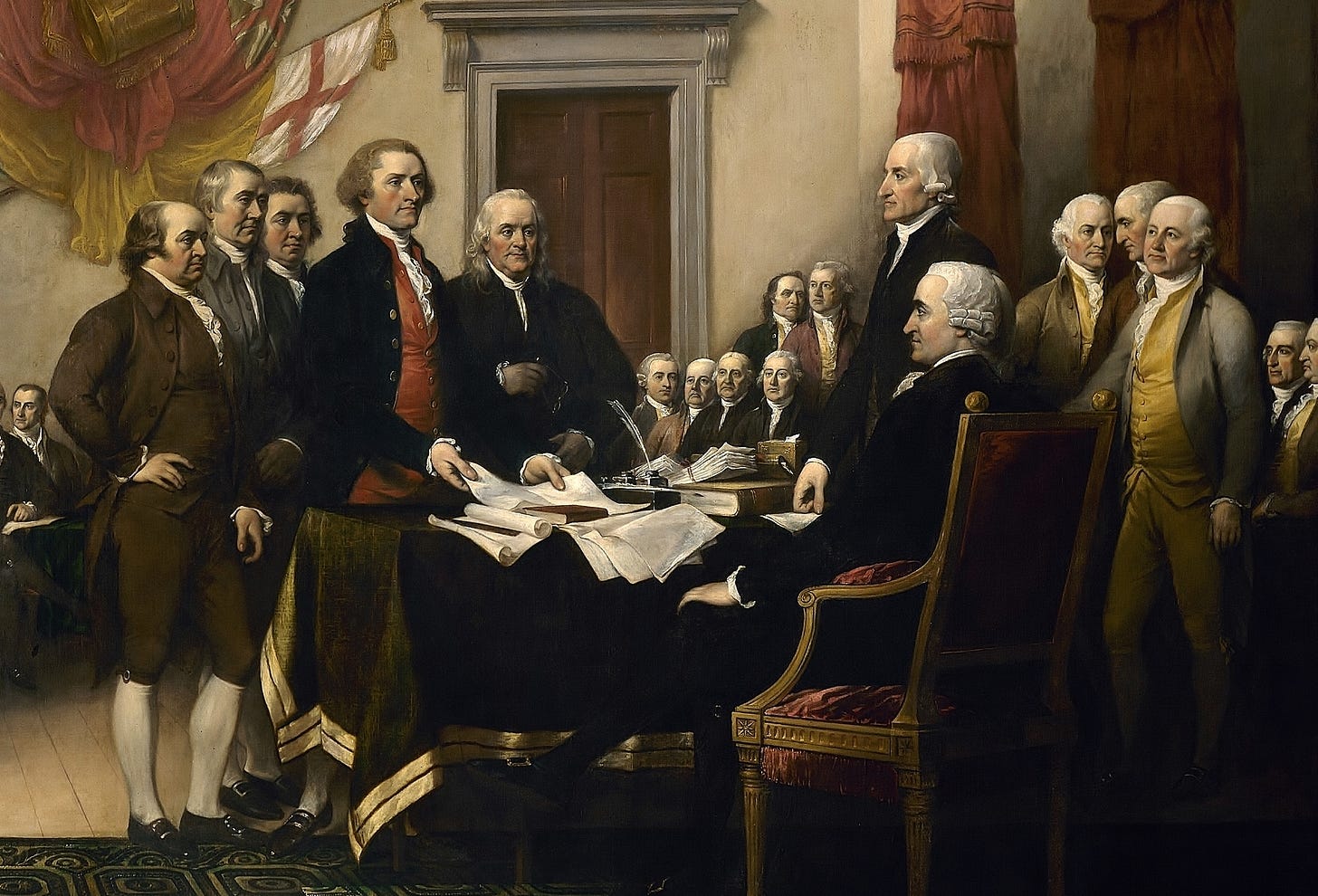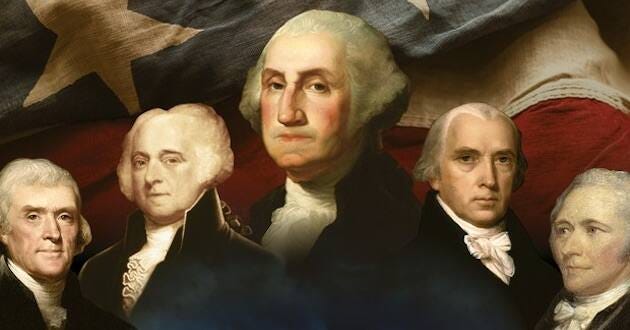Covenant and Constitution
The Covenantal Worldview of the Founding Fathers
Modern historical memory testifies to its own decay when the language of “covenant”—the very theological heartbeat of the American founding—is now either forgotten or distorted by postmodern cynics and secular skeptics. And yet, to remove the concept of covenant from the early American mind is like removing blood from the veins and expecting the body to walk. The covenantal worldview was not merely a theological curiosity; it was the animating force behind the Founders’ conception of law, liberty, rights, oaths, and the republic itself.
The American experiment was, at its root, a bold political covenant—a sacred pledge under God, in view of posterity, that a free people, guided by divine law, could govern themselves according to justice and truth.
A People in Covenant: The Theological Architecture
Founders were, by and large, steeped in a Protestant milieu, particularly Reformed theology, which emphasized biblical covenants as the very structure of God’s relationship with mankind. Though not all were devout Christians, many drank deeply from the well of biblical political theology, especially through thinkers like John Calvin, Samuel Rutherford, and the Hebrew Republic of the Old Testament.
As Perry Miller famously observed, “The federal theology… gave political life a sacred dimension, and gave spiritual life a political form.”¹
The biblical concept of covenant bound a people to God through mutual obligation. It presumed:
A divine Lawgiver who initiates the covenant (cf. Gen. 12; Exod. 19)
A chosen people who freely accept the covenant terms
Oaths and sacrifices, binding both parties
Moral consequences for obedience or disobedience
And a transgenerational mission—“for you and your children after you” (Gen. 17:7)
In short, covenant was the divinely ordained marriage of heaven’s justice with history’s responsibility.
Liberty by Oathswearing
The Founders understood liberty not as licentious autonomy but as covenantal freedom—a freedom ordered to moral duty and allegiance to the Creator. Consider the language of the Declaration of Independence: “We mutually pledge to each other our Lives, our Fortunes and our sacred Honor.”² That is not a contract. That is an oathswearing formula. It is an inherently covenantal structure.
In the biblical tradition, covenants were ratified with solemn vows. The Founders knew this, and so they made their new republic dependent on oath-making. The Constitution itself requires that all officials “shall be bound by oath or affirmation, to support this Constitution.”³
Why? Because they understood what John Locke, despite his theological inconsistencies, got right when he said: “An oath… is a solemn appeal to God.”⁴ They did not believe in a paper republic but in a moral one—bound by truth, not mere power.
Thus, as James Wilson, one of the first Supreme Court Justices, said: “Human law must rest its authority ultimately upon the authority of that law which is divine.”⁵
Fatherhood, Sonship, and Ordered Liberty
The Founders, formed by Scripture and steeped in a classical and Christian moral order, believed the political was downstream from the theological. If God is a Father, then man is not merely a subject—he is a son. And as such, he is called not only to obedience, but to maturity. This concept of covenantal sonship was pivotal.
Liberty, in the Christian covenantal imagination, is not the absence of restraint but the “freedom of the children of God” (Rom. 8:21).
Law, properly understood, is not tyranny but the training ground of virtue.
Thus, they designed a republic that expected men to govern themselves first before governing others.
The New England Puritans, for example, often described their communities as “plantations of the Lord,” using Mosaic covenantal language to see themselves as a new Israel in covenant with God. Their early covenants, such as the Mayflower Compact (1620), explicitly framed civil government as a sacred covenant “in the presence of God and one another.”⁶
As political philosopher Daniel Elazar explains, “The American Constitution is best understood as a continuing political covenant.”⁷
Marriage and the Household as the Covenant School
Covenant does not only shape nationhood; it begins in the home. The Founders widely believed that the marriage covenant was the foundational structure of society. As John Adams wrote, “The foundation of national morality must be laid in private families.”⁸
Marriage was seen not merely as a sentimental bond but as a divinely instituted covenant, forming the primary training ground of citizens. The father was not a bureaucratic sperm donor, as modernity might prefer, but a patriarch—a provider, protector, and priest—whose household mirrored the covenantal structure of God’s own household.
This was not incidental to the Founders’ thinking; it was essential. The erosion of the family, as we now see, is the erosion of covenant and, therefore, the disintegration of the republic.
Rights as Divine Endowment
At the heart of the Declaration lies the phrase: “endowed by their Creator with certain unalienable Rights.” This is no throwaway line. It is an ontological claim about the source of rights. The fact is, rights do not come from kings; nor do they come from majorities. Our rights come from God, precisely because man is a bearer of the imago Dei (cf. Gen. 1:27), the divine image of God. As George Washington reminded us so prophetically in his Farewell Address, “Of all the dispositions and habits which lead to political prosperity, religion and morality are indispensable supports.”⁹
The concept of rights is covenantal in structure:
Rights are granted by God in the covenant
They entail reciprocal duties
They are protected not by power but by moral obligation
This is also the reason why Frederick Douglass, echoing the covenantal thought of our Founders, had the fortitude to call America to account not by rejecting its covenant, but by demanding it be honored to its fullest.¹⁰
Moral Obligation and the Threat of Apostasy
The Founders believed that liberty could not survive without virtue. As Benjamin Franklin quipped: “Only a virtuous people are capable of freedom.”¹¹
This belief flowed from covenant theology: disobedience to God leads not merely to personal ruin but national judgment. The blessings of liberty were conditioned on moral order. Noah Webster understood this and commented without irony, “The moral principles and precepts contained in the Scriptures ought to form the basis of all our civil constitutions and laws.”¹² In other words, America would either be a faithful covenant people under God or a people shattered by the very laws of the covenant they violated. When one violates covenant, the laws of the covenant aren’t broken—the laws of the covenant break you.
From Sinai to Philadelphia: A Covenantal Political Theology
We should not be so naïve as to suggest the Founders were flawless prophets. Many were men of compromise and sin. But they understood what our elites do not: a republic cannot survive on material power alone. It must be bound together by moral law, by sacred vows, by divine grace, and by virtuous accountability.
They looked to Sinai as a model: a people bound to law and kinship by covenant, forming a familial, unified polity under God’s rule.
Thus, they called their Constitution not merely a charter, but “the supreme Law of the Land”—an echo of Torah.
And they prayed—yes, they actually prayed—that “the propitious smiles of Heaven may continue to bless us,” as Washington once put it.¹²
Today, our culture scoffs at such prayers while legalizing barbarism. We have not only broken covenant; we have spat upon the very idea of covenant.
The Covenant Fulfilled: Christ as True Liberty
The constitutional covenant, for all its noble aspirations, remains temporal and imperfect. It cannot save. But it pointed—dimly yet truly—toward the greater Covenant made in Christ, and the biblical structures of a covenantal worldview.
For in Jesus, the true Son of the Father, we find the fulfillment of all earthly covenants. He is the King who governs in justice, the Priest who intercedes in mercy, and the Bridegroom who weds His Church in eternal fidelity.
And it is only in Him, as Paul says, that we have “freedom from the law of sin and death” (Rom. 8:2), and the true adoption as sons (Gal. 4:5). Christ is the New Covenant, ratified not by ink and parchment, but by blood and Spirit.
Let us therefore call America not to abandon covenant, but to return to the true one; in essence, not merely the social compact of 1787, but the eternal covenant of Christ found in the Scriptures, and revealed to us through the mind and heart of the Christian faith.
Footnotes:
Perry Miller, The New England Mind: The Seventeenth Century (Cambridge, MA: Harvard University Press, 1939), 395.
Declaration of Independence, July 4, 1776.
U.S. Constitution, art. VI, cl. 3.
John Locke, Two Treatises of Government, ed. Peter Laslett (Cambridge: Cambridge University Press, 1988), 379.
James Wilson, Collected Works of James Wilson, ed. Kermit L. Hall and Mark David Hall (Indianapolis: Liberty Fund, 2007), 1:106.
Mayflower Compact, 1620.
Daniel J. Elazar, Covenant and Polity in Biblical Israel (New Brunswick, NJ: Transaction Books, 1995), 1.
John Adams, Diary and Autobiography of John Adams, ed. L.H. Butterfield (Cambridge, MA: Belknap Press, 1961), 3:233.
George Washington, “Farewell Address,” September 17, 1796.
Frederick Douglass, What to the Slave Is the Fourth of July?, speech delivered July 5, 1852.
Benjamin Franklin, quoted in James Madison, Notes of Debates in the Federal Convention of 1787 (Athens: Ohio University Press, 1985), 316.
Noah Webster, Letters to a Young Gentleman Commencing His Education (New Haven: S. Converse, 1823), 18.
George Washington, First Inaugural Address, April 30, 1789.






